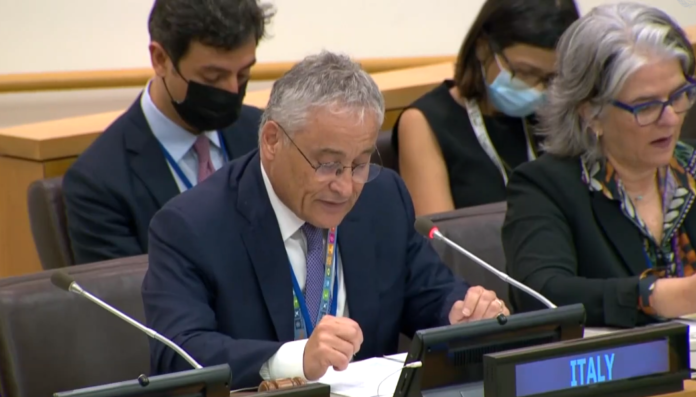NEW YORK, JANUARY 28 – “The Uniting for Consensus Group’s proposal on the reform of the Security Council would enhance regional representation”, the Permanent Representative of Italy to the UN, Maurizio Massari, said on behalf of UfC during the first session of the year of the Intergovernmental Negotiations for the 77th Session of the General Assembly. The session met on January 26th. “Now more than ever the world is looking at us and we cannot afford to fail in reforming this Organization”, Massari said, stressing that the Group will continue to engage in a constructive and committed manner, with the widely-shared objective of a more representative, democratic, transparent, accountable and effective Security Council.
“Through the reform, we should aim at increasing the Council’s legitimacy and authority in the eyes of the international community and the global public opinion”, said Massari presenting UfC position: “Unnecessarily focusing our attention on process and procedure will not provide any added value to our work here. For this reason, it is crucial that we concentrate on the substantial issues at hand, building upon the progress made during the last session as reflected in the revised Elements and convergences and divergences paper”.
The IGN continues to enjoy broad support from the Member States and is still considered to be the appropriate platform to discuss a comprehensive reform of the Security Council: “We believe it is crucial to maintain its consolidated format, its distinctive informality and interactivity, in order to move the negotiations out of the impasse that took place within the Open Ended Working Group”, said Massari, stressing that the UfC is not contrary to Text-Based Negotiations per se, but rather deems them “premature at this stage”, considering the persistent divergences on key principles of the reform. According to the UfC, a credible and viable reform of the Council requires a comprehensive and integrated approach, addressing all the five key issues, as outlined in Decision 62/557: “Any piecemeal approach, which does not take into due consideration the inter-linkages between the issues at stake, would be partial and unlikely to succeed.
Addressing the theme of the first meeting – the cluster of “Regional Representation” and the interlinkages with other clusters – the Ambassador clarified UfC’s view on concepts such as “equitable geographical distribution” and “regional representation”:
“Equitable geographical distribution”, as reflected under Article 23 of the UN
Charter, in the Group’s view means that the composition of the Council must equitably
reflect the different geographical groups within the UN membership and their
respective weight according to the size of the group. “Regional representation”, on the other hand, refers to one or more Member States representing the interests and positions of others, such as a regional group.
In this respect, it is important to note that the Charter (article 23) refers to elections and geographical distribution as characteristics of “equitable representation” only with regard to elected members, whereas it makes no reference to regional or equitable representation in its definition of permanent members.
UfC is committed to strenghtening and enhancing equitable geographical distribution, which can lead to strengthened regional representation. This can only be achieved by increasing the number of elected members. At the same UfC is convinced that adding new permanent members to the Security Council does nothing to increase regional representation. In fact, while elected members of the Council must always heed the interests of those they
are representing, permanent members – not subject to elections – do not represent the wider membership: they represent themselves alone.
The UfC fully understands the call of African countries, the Arab Group and developing countries for a more equitable and strengthened representation on the Security Council. “We certainly respect this and we fully agree that they must be able to play their rightful role in the activities of the Council. That would not only help correct historical injustices, it would benefit us all by making the reformed Security Council truly fit for purpose.
UfC’s proposal would indeed enhance regional representation: Africa would become the largest group in the reformed Council; Asia-Pacific would have the highest percentage increase; Latin America and Eastern Europe would double their representation. This distribution would also allow an increased and more stable representation for cross-regional groupings, such as the Arab group, and would take into due consideration the interests of all developing States, especially SIDS and Small States. The latter would be assigned a rotating two-year non-permanent seat that would ensure their continued presence in the Council.
Massari reiterated UfC’s opposition against new permanent seats which “would make the Council less accountable, less representative, less democratic and effective, further increasing the difficulties in reaching decisions on urgent matters of international peace and security”. Summing up the Group argument the Italian Ambassador said that all regions must be represented in a more equitable manner and Council members must be more accountable to the UN membership as a whole, especially to their own regions.
The only way to achieve this, is through periodical elections and a greater democratization of the Security Council. The possibility of reelection increases and reinforces accountability, especially of longer-term Members, as at the end of their mandate their activity as members of the Council would be assessed by the membership as a whole and by the respective regional groups in order to consider their re-elections. (@OnuItalia)

